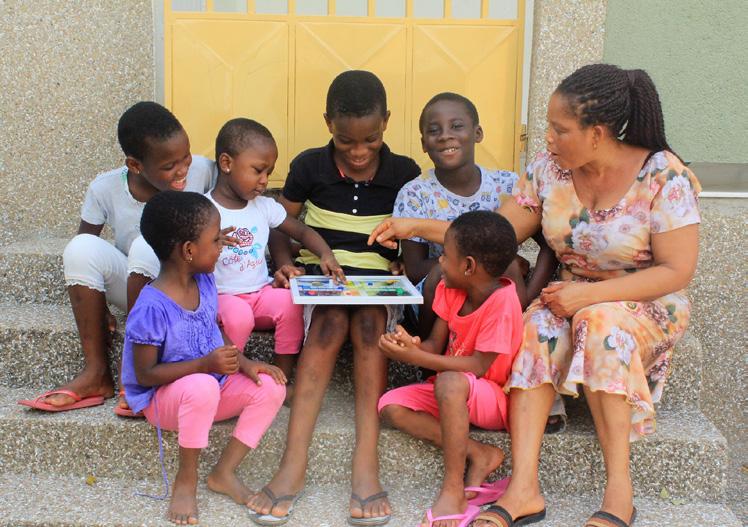We differentiate ourselves because we: 1. Focus on the children –
the solution, so that it can assume
UN Guidelines for the Alternative Care of Children
responsibility in the future.
In 2009 the United Nations welcomed the UN
• The community is involved and is part of
by listening to and respecting their opinion,
Guidelines for the Alternative Care of
we can provide children and young people
Children. They provide governments with a
with the support they need and we involve them in shaping their own future.
• Children and young people are empowered because all our activities focus on their growth towards becoming
1.5 OUR GUIDING FRAMEWORKS – THE CHILD IS PARAMOUNT
self-reliant adults.
the rights of the child on the agenda at
The 1989 UN Convention on the Rights of the
promotes and implements the UN Guidelines
authorities and governments.
Child is the most-ratified convention in the
in association with other organisations in
world. It provides governments with a
international care for children.
framework for establishing national legislation
Our organisation has made an important
foundation – a strong, loving and safe
that aims to improve the lives of children. Its
contribution to the establishment of the UN
family constitutes our basic principle for the
four key principles are:
Guidelines for the Alternative Care of Children
• In our work we prioritise preventive,
world. SOS Children’s Villages actively
and the subsequent manual ‘Moving 1. Non-discrimination - all children have the same rights;
Forward’. The latter document provides implementers with further details and positive
family-strengthening care to prevent
2. The interest of the child is paramount;
examples that help them translate and
families breaking up and children being
3. The right to life, survival and development;
implement the Guidelines in the context of
neglected or abandoned.
4. The right to freely express views and to be
local circumstances and cultures.
• We provide suitable, qualitative
heard. Guidelines for the Reintegration of
SOS or foster family, if children have to
Unfortunately, the reality in many countries is
Children
fend for themselves or can no longer
that the rights of the child are still being flouted.
In 2016, the ‘Guidelines for the Reintegration
grow up safely within their family.
The fact that 220 million children worldwide
of Children’ were published, arising from the
have lost their parental care or run the risk of
UN Guidelines for the Alternative Care of
• We keep siblings together.
• In the family-strengthening programmes
doing so, serves as harrowing proof of this. It
Children and the great emphasis placed
a personal development plan is compiled
means the Convention is also the guiding
therein on the temporary nature of
with each family.
framework in our work. Particularly the rights
out-of-home placements, if it is at all possible
that refer to parental care - with regard to the
to make the home situation of children safe
3. Adopt a local approach and involve
care. The Guidelines are not legally binding practice on laws and regulations all over the
(temporary) family-based care within an
offering high-quality alternative (family-based)
UN Convention on the Rights of the Child
children and young people.
necessary and in the interests of the child,
but have already had a considerable impact in
healthy growth and development of
families and help them stay together or, if
voice and jointly work with them to place
• We give children and young people a
2. Believe that family serves as the
technical and practical framework to support
lack thereof - alternative family-based care and
again. It is a framework aiming to support
the community in promoting
the right to protection, education, medical care
authorities and caregivers in carefully
sustainable Civic Driven Change.
and participation.
implementing the process of reintegrating
• Worldwide, we work from the community
children and young people in families in their
through which we implement our mission and
Our basic principles
with local, dedicated SOS staff. They are
The right to be heard
communities. SOS Children’s Villages has
the commitments to quality care. It is a policy
Our knowledge and experience of the existing
familiar with the local situation and
When carrying out our work, the interest of the
co-signed these Guidelines.
with which all member associations of SOS
context, which is continuously evolving, is
culture, know the children and the
child is always paramount. The right of children
Children’s Villages International must comply
incorporated in four basic principles. These
families and are around long-term.
to be heard led to our commitment to first listen
SOS Care Promise
and to which they must dedicate themselves.
basic principles represent the guidelines for
• We use the knowledge and contacts
and only then act. This not only means we can
The SOS Care Promise is the policy that
The SOS Care Promise was approved by the
people all over the world to ensure positive
available in the community and at the
provide children with the support they really
articulates both what we do and how we do it
Senate in 2018 and encourages us to
change and that many more children can
same time we improve skills and build
need, but above all we involve them in the
via the principles and values that are the
continuously reflect on the local reality and
grow up in a strong, loving family and a safe
capacity where needed.
decisions that affect their lives.
foundation of our work, the care solutions
context.
environment.
9 | SOS CHILDREN’S VILLAGES ANNUAL REPORT 2020






















